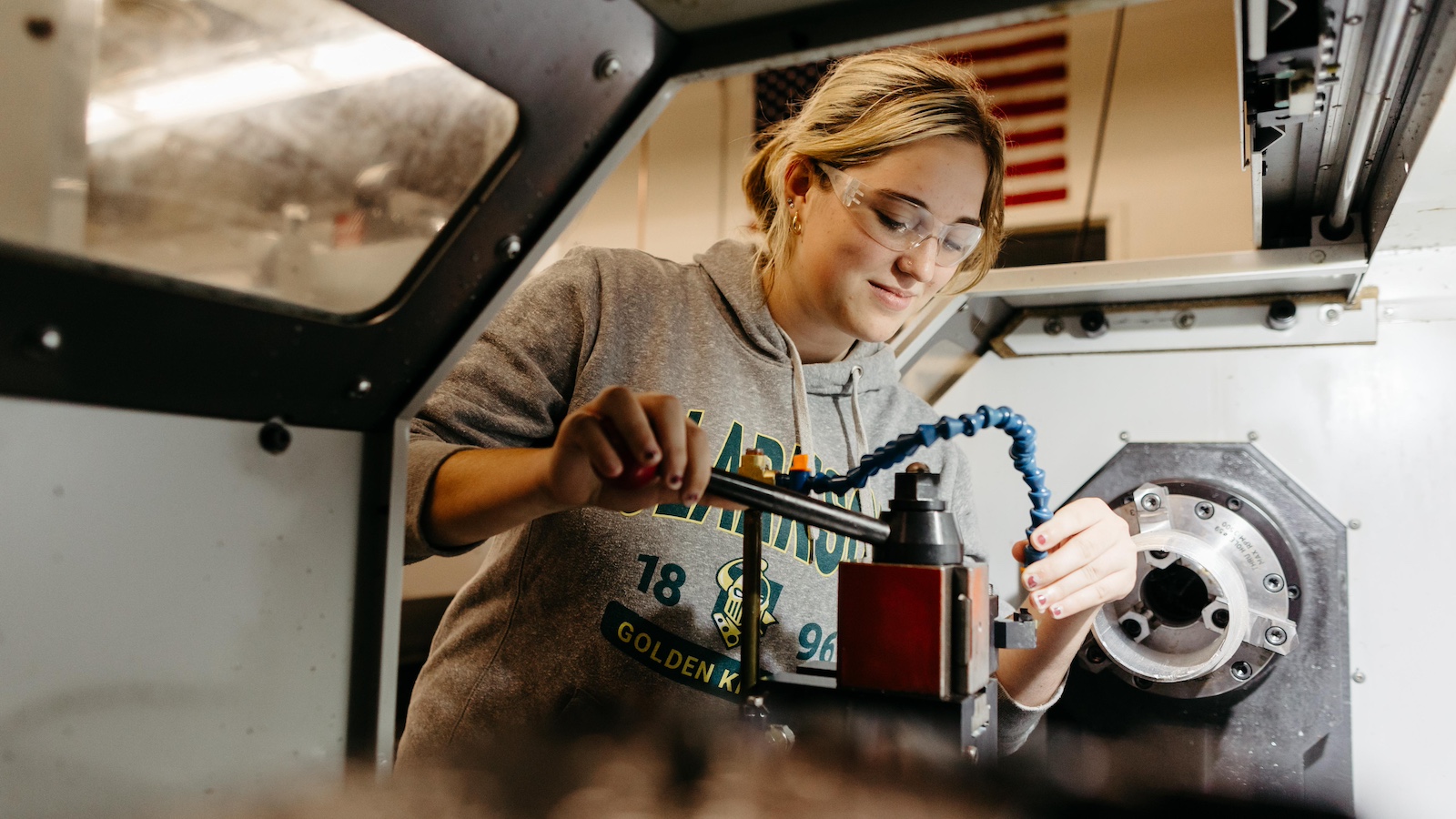SPEED Program Machine Shop

The Student Prototyping Machine Shop at Clarkson University is your one-stop shop for any design and fabrication needs.
Though it is most actively used for SPEED (Student Projects for Engineering Experience and Design) competitions, all students have access to the Student Prototyping Machine Shop's state-of-the-art facilities. Use the shop's equipment and resources to build the vital piece for your team competition. Test and experiment with your own devices. Complete projects for courses that involve design. Take the idea of a hands-on education at its most literal level and see what you can achieve.
Tour the Student Prototyping Machine Shop
Explore the Machine Shop with Jonathan Kent '25!
Hours and Information
The Student Prototyping Machine Shop is supervised by Clarkson's Technical Support Services.
Business hours are 8 a.m. to 4:30 p.m., Monday through Friday. We also offer extended hours on evenings and weekends under supervision. The shop is located in the CAMP building.
Equipment and Instruction
The machine shop includes:
- CNC milling machines and lathes.
- High-quality manual machines.
- An extensive welding lab with TIG, MIG, Plasma table and gas equipment.
- Water jet cutting.
- Wire EDM Cutting.
- Up to five axis computer-driven machining centers.
Skilled machinists staff the shop at all times to ensure safety and help solve any problems you may have when using the equipment. They also conduct mandatory training courses in appropriate and safe equipment use and to help our student body advance their technical skills.
MT Courses
The Multidisciplinary Project Team Undergraduate Courses (MT Courses) are safety certification courses designed to introduce students to the basic theory and operation of the machines in the student shop. Students must complete all courses to use the equipment.
This course covers simple shop procedures, including measurement and layout, drills and drill presses, use of hand taps and proper use of the various band saws. It involves the use of the composite lab and woodworking equipment. It consists of two lectures/labs of three hours each and is offered as a pass/no credit course.
This course covers the basic theory and operation of the metal lathe. Topics include tool grinding, turning, facing, boring, parting, threading, etc. It consists of three lectures of one hour each and three two-hour lab sessions. It is offered as pass/no credit. Prerequisite is MT51.
Basic Milling covers the theory and operation of the Grizzly and Bridgeport Vertical mill. Topics covered include the setup of the mill, fixturing, zeroing parts, cutters and milling techniques for various materials. This course consists of three one-hour lectures and three two-hour labs. It is offered as pass/no credit. Prerequisite is MT52.
Learn the basics of CNC machine programming and operating HAAS machining centers. Topics covered include machine startup and homing, conversational programming, drill patterns, profiles and pockets. The course consists of three one-hour lectures and three two-hour labs. It is offered as pass/no credit. Prerequisite is MT53.
Basic Welding addresses the operation and use of welding equipment in a safe and effective manner. Topics include general welding safety, oxygen-acetylene techniques, basic arc welding, MIG welding, TIG welding and use of the plasma cutting torch. The course consists of three one-hour lectures and four two-hour labs. It is offered as pass/no credit. Prerequisite is MT51.
This course is an overview of the CAD software MasterCam. Students learn to draw, choose tool paths, create machine code and run programs on CNC mills using CAD. Lectures are on Mondays, and one lab is scheduled during the remainder of the week. The course consists of three one-hour lectures and three two-hour labs. It is offered as pass/no credit. Prerequisite is MT54.
This course covers the use of precision lathes in the student shop. Students learn to set up and machine on several different lathes using advanced techniques and tooling. Lectures are on Mondays and one lab is scheduled during the remainder of the week. The course consists of three one-hour lectures and three two-hour labs. It is offered as pass/no credit. Prerequisite is MT52.
This course covers the basics of CNC lathe operation and programming utilizing a HAAS lathe. Topics covered include machine startup, operation and G Code programming. Students learn outside and inside diameter turning and threading, complex turning profiles and canned cycles. This course consists of four one-hour lectures and three two-hour labs. It is offered as pass/no credit. Prerequisite is MT57.
